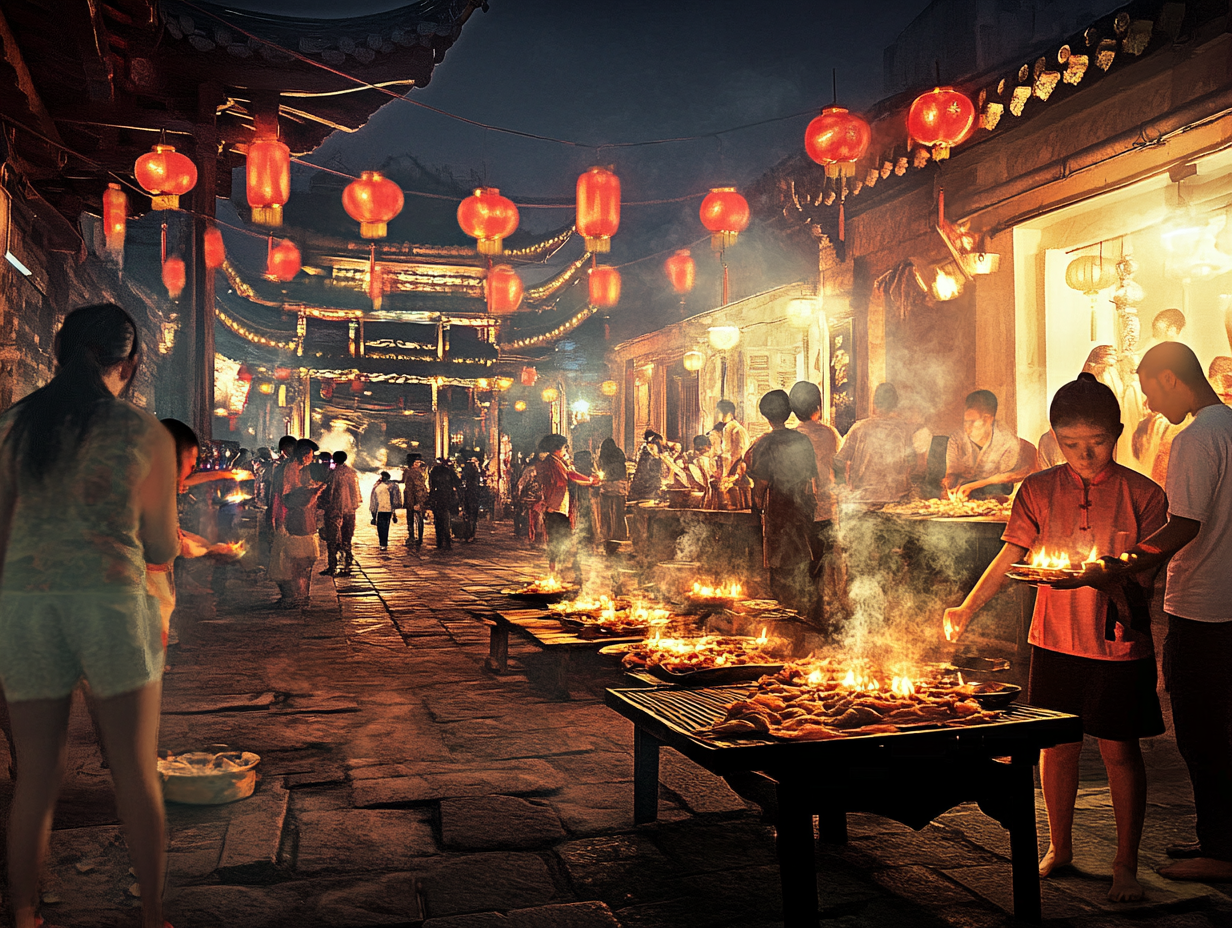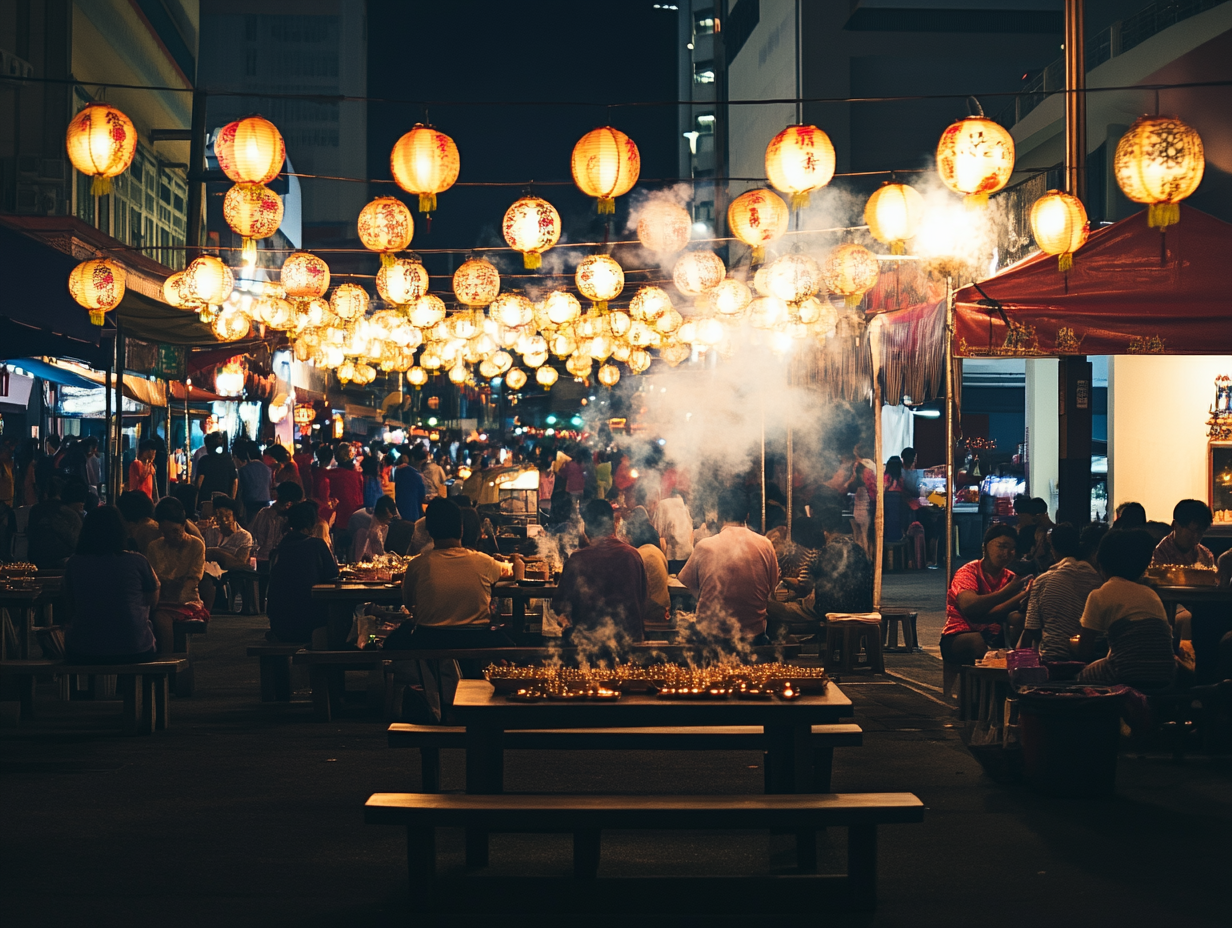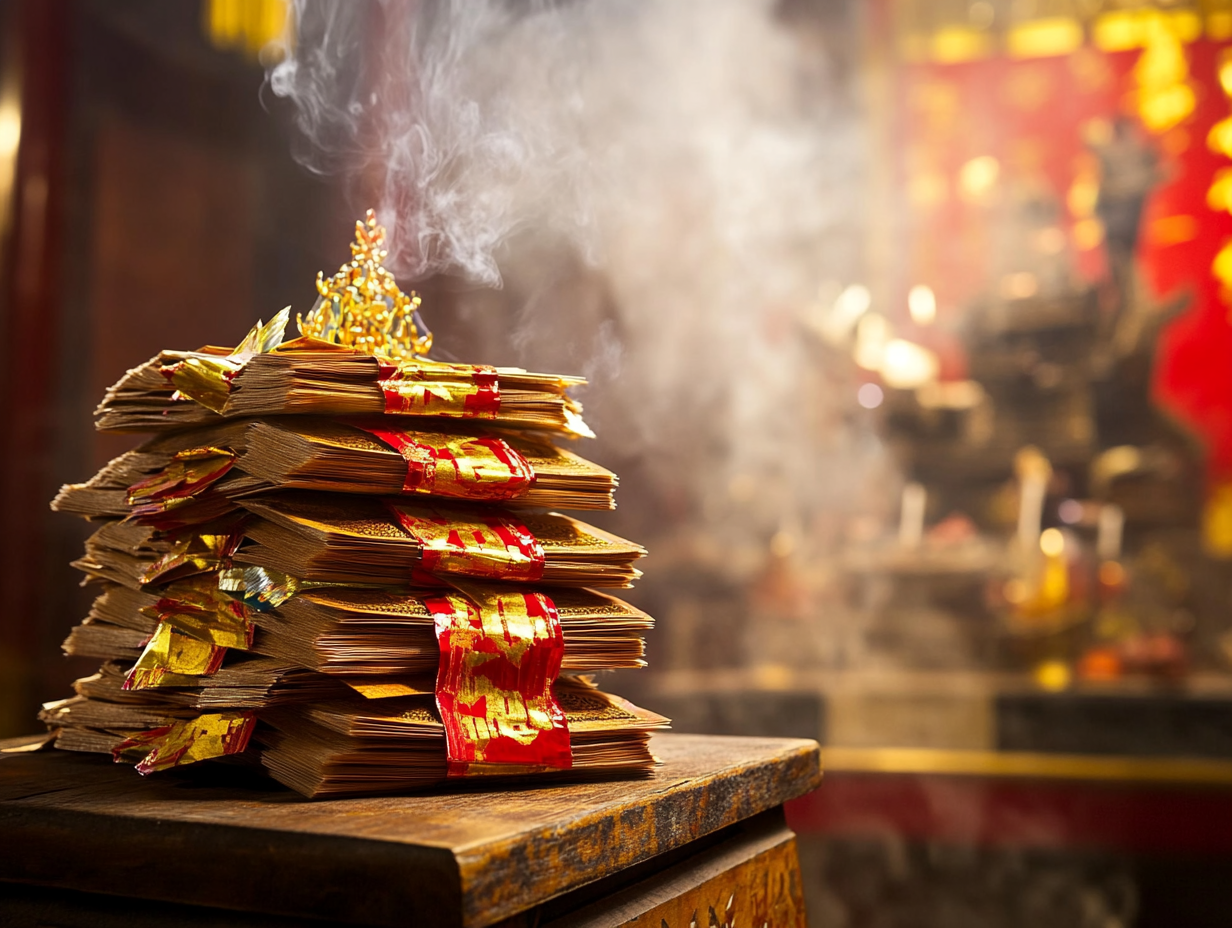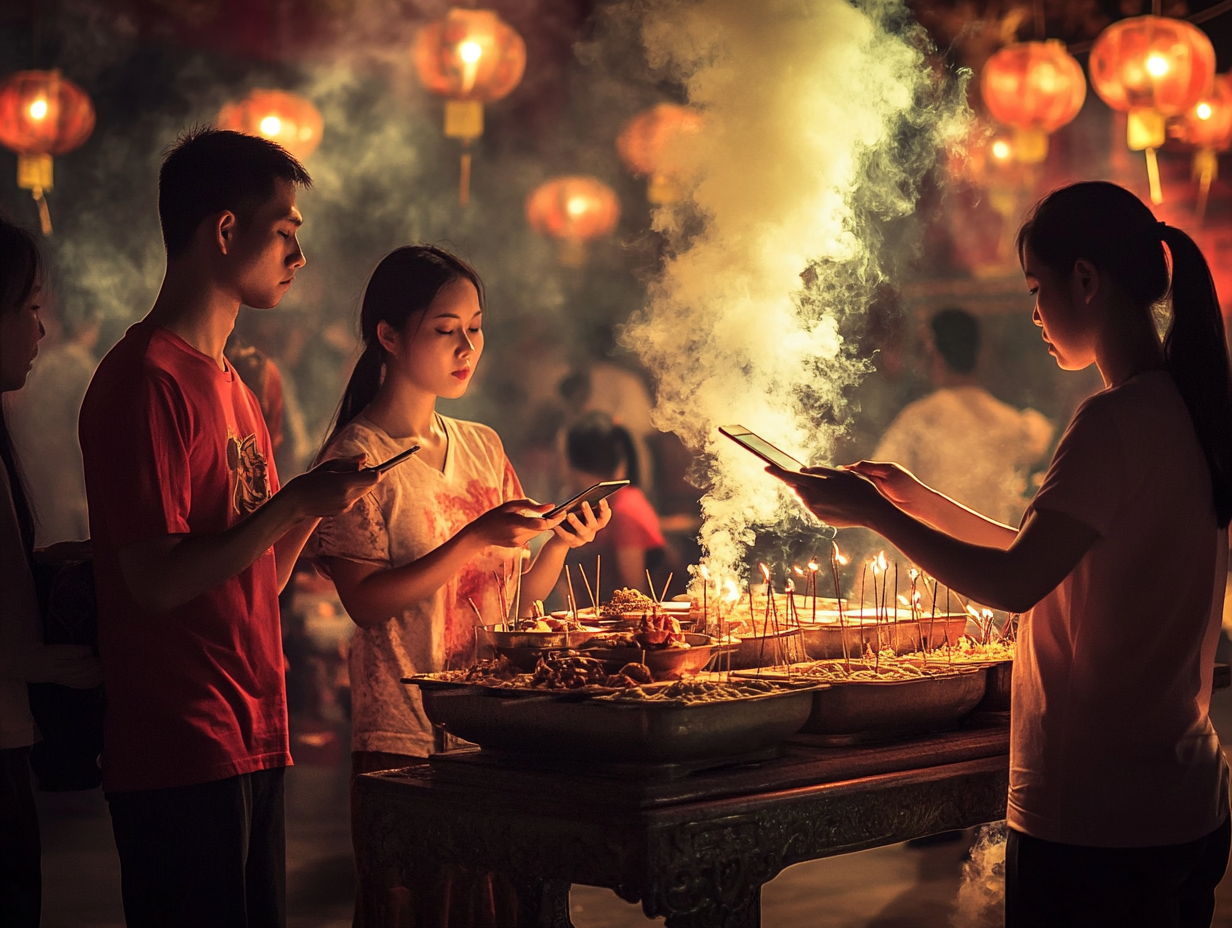The Hungry Ghost Festival, also known as Zhongyuan Festival (中元节) in Taoism and Yulanpen Festival (盂兰盆节) in Buddhism, is a traditional East Asian celebration that honors deceased ancestors and appeases wandering spirits. It falls on the 15th day of the seventh lunar month, which typically occurs in August or early September on the Gregorian calendar. In 2025, people will observe the Hungry Ghost Festival on August 12.
Unlike other festivals that focus on joyous reunions with spirits (like Qingming or Obon), the Hungry Ghost Festival is rooted in the belief that during this time, the gates of the underworld open, allowing spirits to roam freely in the human world.
Historical and Cultural Background
Origins in Taoism and Buddhism
The Hungry Ghost Festival has deep roots in both Taoist and Buddhist traditions. In Taoism, it is part of a trio of important festivals during the Three Yuan Festivals (上元、中元、下元). The seventh month, also known as the Ghost Month, is believed to be a time when yin energy is strong and the spirits of the dead return.
In Buddhism, the festival is connected to the Ullambana Sutra, which tells the story of Maudgalyayana (Mulian), a disciple of the Buddha, who tries to save his mother from the realm of hungry ghosts by offering food and prayers through the monastic community.
Spread Across Asia
Although the core beliefs are similar, the Hungry Ghost Festival is widely spread and celebrated in different ways in countries such as China, Taiwan, Singapore, Malaysia, Vietnam, and Thailand, each with its own customs and rituals.
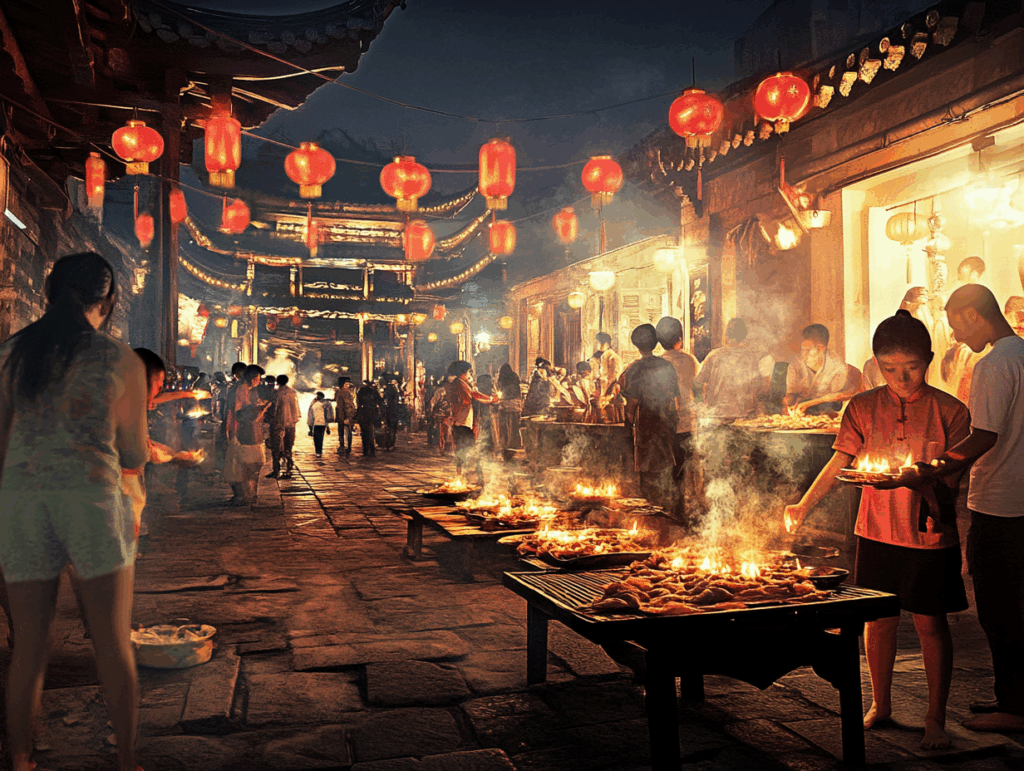
Key Beliefs and Symbolism
Who Are the Hungry Ghosts?
In Chinese folk religion, hungry ghosts (餓鬼) are spirits of people who died in tragic or unnatural ways, or those who were not given a proper burial or offerings. These ghosts are said to suffer from insatiable hunger and emotional torment.
They are often depicted as having tiny throats and bloated stomachs, symbolising their inability to satisfy their cravings—both for food and emotional closure.
Purpose of the Festival
The festival serves several purposes:
- Appeasing angry or wandering spirits
- Providing comfort to ancestors
- Ensuring the protection and well-being of the living
- Accumulating merit through good deeds and offerings
Traditional Rituals and Practices
Offerings of Food and Joss Paper
One of the most common practices during the Hungry Ghost Festival involves preparing lavish food offerings for both ancestors and wandering spirits. Families place these offerings on altars or tables outside their homes or businesses.
People burn joss paper—also known as spirit money or ghost money—as symbolic offerings. They also burn paper replicas of items like clothes, houses, phones, and even cars, believing these will reach loved ones in the spirit world.
Public Performances
In many communities, Getai performances—lively shows featuring music, comedy, and opera—are held to entertain both the living and the spirits. The front row of seats is usually left empty as a sign of respect for the ghostly audience.
Floating Lanterns and Water Rituals
In some regions, people release lotus-shaped lanterns on rivers or lakes to guide lost spirits and prevent them from causing harm. This tradition is especially common in Buddhist communities.In some regions, people release lotus-shaped lanterns on rivers or lakes to guide lost spirits and prevent them from causing harm. This is especially common in Buddhist communities.
Modern Adaptations of the Festival
Digital Joss Paper and Online Altars
In 2025, the tradition has taken on new forms. With increasing environmental awareness and the rise of digital platforms, people now use digital joss paper offerings and online ancestor altars to honor the dead in a more eco-conscious way. These practices offer convenience, especially for those living far from ancestral homes or in urban areas.
Virtual Performances and E-Ceremonies
Some communities now stream virtual Getai shows or conduct rituals via Zoom or YouTube, making the festival more accessible to global audiences while preserving its cultural essence.
Cultural Taboos and Superstitions
The Hungry Ghost Month is considered a spiritually sensitive time, and there are many taboos people follow to avoid bad luck or spirit disturbances:
- Avoid staying out late at night
- Don’t hang clothes outside after dark
- Avoid swimming (ghosts are said to drown people)
- Don’t pick up random objects on the street
- Avoid getting married or making a major life decision
These taboos are not universally followed but are taken seriously by those who hold traditional beliefs.
The Hungry Ghost Festival in Singapore
In Singapore, the festival is widely celebrated among the Chinese community, especially by Taoists and Buddhists. Large-scale Getai stages, incense-burning ceremonies, and street offerings appear in neighbourhoods like Chinatown, Geylang, and Toa Payoh.
The Singaporean government designates specific areas for burning joss paper, and many citizens join community-led rituals organised by local temples and clan associations.
Why the Festival Still Matters Today
Even in a fast-paced, modern world, the Hungry Ghost Festival remains an important reminder of filial piety, respect for ancestors, and the unseen spiritual dimensions of life. For many, it’s not just about appeasing spirits but about maintaining cultural identity and continuity across generations.
Conclusion
The Hungry Ghost Festival is a deeply spiritual and culturally rich tradition that continues to evolve with time. Whether through traditional rituals, digital offerings, or eco-friendly practices, the essence of the festival remains: to honor the dead, accumulate good karma, and keep the harmony between the living and the spiritual world.
